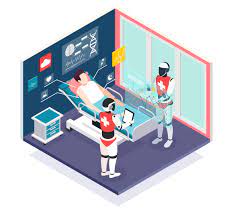Introduction
The integration of Artificial Intelligence (AI) in healthcare diagnosis represents a paradigm shift in medical practices, offering the potential for more accurate and efficient disease identification. However, this transformative use of AI in healthcare diagnosis raises significant ethical considerations. This article explores the ethical dimensions surrounding AI in healthcare diagnosis, addressing issues of transparency, bias, patient privacy, and the evolving role of healthcare professionals.
Ensuring Transparency in AI Algorithms
One of the primary ethical concerns in AI-driven healthcare diagnosis is the need for transparency. Patients and healthcare providers must understand how AI algorithms arrive at diagnostic conclusions. The lack of transparency may lead to mistrust and skepticism, making it crucial for AI developers to provide clear explanations of the decision-making processes of their algorithms.
Addressing Bias in AI Algorithms
AI systems learn from vast datasets, and if these datasets contain biases, the algorithms can perpetuate and even exacerbate those biases. In healthcare diagnosis, biased algorithms may lead to disparities in the accuracy of diagnoses among different demographic groups. Ethical considerations involve actively identifying and mitigating biases to ensure fair and equitable healthcare outcomes for all patients.
Preserving Patient Privacy and Data Security
The use of AI in healthcare diagnosis involves the processing of sensitive patient data. Ethical considerations demand robust measures to protect patient privacy and ensure the secure handling of medical information. Striking a balance between leveraging data for diagnostic accuracy and safeguarding patient privacy is essential to maintain the trust and confidence of individuals seeking medical care.
Informed Consent and Patient Autonomy
In the context of AI-driven diagnosis, informed consent becomes crucial. Patients have the right to know if AI algorithms are involved in their diagnosis and should provide explicit consent for such involvement. Respecting patient autonomy ensures that individuals are actively involved in decisions about their healthcare, including the use of AI technologies in the diagnostic process.
Collaborative Decision-Making with Healthcare Professionals
AI in healthcare diagnosis should be viewed as a tool to augment the capabilities of healthcare professionals rather than replace them. Ethical considerations emphasize the importance of collaborative decision-making, where AI complements the expertise of healthcare professionals. Human oversight ensures that diagnoses are contextualized, and individual patient circumstances are appropriately considered.
Managing Overreliance on AI Diagnoses
While AI can enhance diagnostic accuracy, overreliance on AI-generated diagnoses poses ethical risks. Healthcare professionals and patients must guard against complacency and remember that AI should support, not replace, clinical judgment. The human touch in medicine remains crucial, encompassing empathy, holistic understanding, and consideration of factors beyond the scope of algorithms.
Striving for Equity in Access to AI Diagnosis
Ensuring equitable access to AI-driven healthcare diagnosis is an ethical imperative. Disparities in healthcare resources and technological access may widen existing gaps in healthcare outcomes. Initiatives to deploy AI technologies must consider the diverse socioeconomic backgrounds of patient populations, aiming to bridge rather than exacerbate existing disparities.
Continuous Monitoring and Algorithmic Accountability
The dynamic nature of healthcare demands continuous monitoring and accountability for AI algorithms. Ethical considerations involve establishing mechanisms for ongoing scrutiny, auditing, and improvement of algorithms over time. This approach ensures that AI systems evolve in tandem with medical advancements, minimizing the risk of outdated or potentially harmful diagnostic practices.
Ethical Guidelines for AI Developers and Healthcare Providers
The development and deployment of AI in healthcare diagnosis require adherence to ethical guidelines. Both AI developers and healthcare providers play pivotal roles in upholding ethical standards. Collaboration between these stakeholders, along with input from ethicists and patient advocacy groups, can contribute to the establishment of comprehensive ethical frameworks.
Educating Patients and Healthcare Professionals
Ethical considerations extend to education and awareness. Patients and healthcare professionals should be informed about the capabilities, limitations, and ethical implications of AI in healthcare diagnosis. Transparent communication fosters a shared understanding and promotes responsible use of AI technologies in medical settings.
Conclusion
The ethical considerations surrounding AI in healthcare diagnosis underscore the importance of responsible development, deployment, and use of these technologies. Striking a balance between technological innovation and ethical principles ensures that AI contributes positively to healthcare outcomes while safeguarding patient rights, privacy, and the integrity of the healthcare profession. As AI continues to evolve in the realm of healthcare, ethical considerations will remain paramount in shaping a future where diagnostic technologies align with the highest standards of patient-centered and equitable care.

